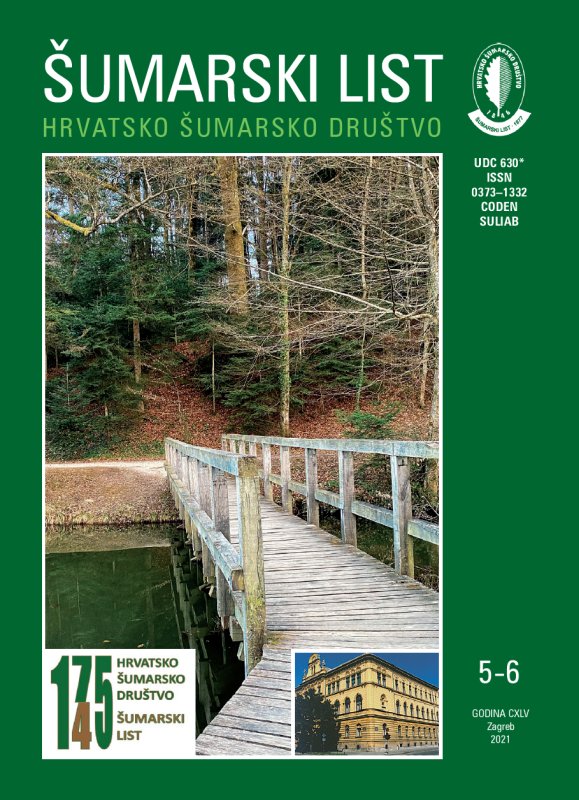
broj: 5-6/2021
pdf (15,7 MB) |
|
||||||||||||||
| RIJEČ UREDNIŠTVA | ||
| Uredništvo | ||
| The demise of a man who has devoted his life to forests and forestry pdf HR EN | 209 | |
| IZVORNI ZNANSTVENI ČLANCI | ||
| Tomislav Poršinsky, Vitomir Kajgana, Željko Tomašić, Andreja Đuka | UDK 630* 453 (001) https://doi.org/10.31298/sl.145.5-6.1 | |
| Gradeability of the cable skidder based on traction performance pdf HR EN | 211 | |
| Krunoslav Sever, Dimitrije Damir Sviličić, Tomislav Karažija, Boris Lazarević, Željko Škvorc | UDK 630*232.3 (001) https://doi.org/10.31298/sl.145.5-6.2 | |
| Photosynthetic response of common beech seedlings to suboptimal mineral nutrition pdf HR EN | 225 | |
| Ahmet Lojo, Jusuf Musić, Besim Balić, Admir Avdagić, Velid Halilović, Aida Ibrahimspahić, Jelena Knežević | UDK 630* 523 (001) https://doi.org/10.31298/sl.145.5-6.3 | |
| Modeling bark thickness of beech (Fagus sylvatica L.) pdf HR EN | 239 | |
| Tark Çtgez, Refik Karagül, Mehmet Özcan | UDK 630*114.1 + 116 https://doi.org/10.31298/sl.145.5-6.4 | |
| Evaluation of the effects of some watershed characteristics on water and suspended sediment yield in agricultural and forest dominated watersheds pdf HR EN | 249 | |
| PRETHODNO PRIOPĆENJE | ||
| Nediljko Landeka, Mirela Uzelac, Danijela Poljuha, Barbara Sladonja | UDK 630* 453 https://doi.org/10.31298/sl.145.5-6.5 | |
| The first record of the asiatic string cottony scale Takahashia japonica in Croatia pdf HR EN | 263 | |
| Summary The Asiatic string cottony scale Takahashia japonica Cockerell (Hemiptera, Coccomorpha, Coccidae) is a species native to Japan. The first record in Europe was observed in Italy in 2017 and again in UK in 2018. In this paper, we provide an overview of the first record of T. japonica in Croatia. First appearance of T. japonica was in 2019 in Pula (Istrian County, Croatia) but the species was determined in spring 2020. In order to collect the field data as efficiently as possible we launched a citizen scientist campaign under title: “A search for an insect – Takahashia japonica”. The campaign was shared to city utility companies in Istria, public institutions of protected areas, NGOs, local newspapers and radio stations. The specific morphology of the eggsacs enabled easy recognition of this species and ensured the accuracy of citizens’ reports. During the campaign we have collected in total seven reports in the city of Pula. The most common host plant of T. japonica was Acer sp. and Morus alba L. some of which have suffered significant defoliation and tree decay. Given the limited infestation and the relatively small number of infected trees, next step is to carry out a complete eradication of the species. The procedures of early detection measures and rapid eradication of invasive pest is in accordance to Regulation no. 1143/2014 of the European Parliament and the Council and by the European and Mediterranean Plant Protection Organization (EPPO). In the end, eradication activities have been agreed with the city utility company Herculanea d.o.o. which is responsible for horticulture and plant protection in the city of Pula. | ||
| Toni Safner, Ana Gracanin, Ivan Gligora, Boštjan Pokorny, Katarina Flajšman, Marco Apollonio, Nikica Šprem | UDK 630* 461 https://doi.org/10.31298/sl.145.5-6.6 | |
| State border fences as a threat to habitat connectivity: a case study from South-Eastern Europe pdf HR EN | 269 | |
| PREGLEDNI ČLANCI | ||
| Marina Milović, Marko Kebert, Saša Orlović | UDK 630* 172.8 https://doi.org/10.31298/sl.145.5-6.7 | |
| How mycorrhizas can help forests to cope with ongoing climate change? pdf HR EN | 279 | |


